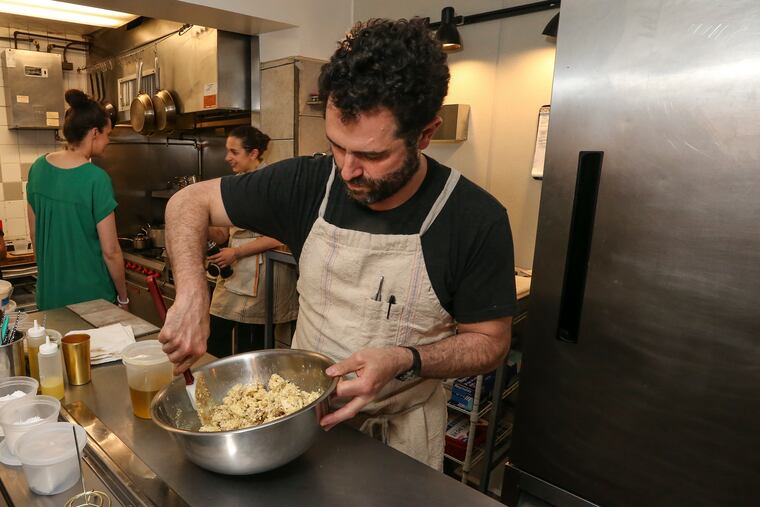Musi and Gabi announce closings as restaurants still face pandemic woes
The closings contradict common thought that the restaurant industry is bouncing back after 2 ½ years.

Destination restaurants Gabi and Musi recently announced their impending closings — Gabi, on North Broad Street just above Vine, will serve its last steak frites on Friday, Sept. 30, while Musi, at Front and Morris Streets in Pennsport, will dish its final tasting menus on Oct. 15.
The closings are pandemic-related, which may seem to contradict common thought that the restaurant industry is bouncing back after 2½ years. This month, for example, has been one of the busiest in memory for openings.
Despite sunny projections — and restaurateurs are an optimistic bunch — the pandemic’s dark clouds still cast gloom. Even after surviving the worst of times, including the shuttering of dining rooms, social distancing, and tepid public sentiment, they are now trying to cope with soaring prices for basics such as food, supplies, energy, and labor. Many are still open fewer days a week and for shorter hours because of an overall shortage of cooks and waiters. And now, inflation is making some people rethink dining out.
» READ MORE: Miel Patisserie, Las Vegas Lounge, and Bar Poulet are the latest to close
Restaurants come and go in all kinds of economies, of course, and fate is never kind to the BYOBs, which cannot prop up their bottom line by selling wine, beer, and spirits.
Musi
In announcing the shutdown of his “little restaurant on a sleepy corner in Pennsport” after 3½ years, chef-owner Ari Miller said he and his staff were fortunate to survive the first two years of the pandemic.
“But as the world opens up, the reality is that the first bloom of our restaurant is over,” he wrote. “And though we welcomed many of you through our door, we are swimming upstream. The pandemic has caught us in a financial riptide in which we managed to not drown. But at this point, it’s no longer possible to maintain our experiment on our forgotten Pennsport corner. We trust you understand that operating a small business in this climate is a monumentally difficult endeavor and ours is no longer financially sustainable.”
He expressed pride in Musi’s high standards in how it engaged with “its sources, its ingredients, its team, and its guests.” Miller started workers at $15 and forged relationships with local suppliers such as Primal Supply, Green Meadow Farm, Kitchen Garden Textiles, Lancaster Farm Fresh, Third Wheel Cheese, Merzbacher’s, Bottle Underground, and Rabbit Recycling.
“We understood our responsibilities and we were uncompromising in our philosophy, to operate outside of the industrial food system as obsession. We termed this approach ‘relationship cuisine.’ We hope that you carry our ethos of relationship cuisine with you, in every one of your decisions of where you’re going to dine, who you’re going to purchase from and who you want to survive.”
In Musi’s last weeks, it will be open Thursday to Sunday with a tasting menu only, and will host private dinners after the Oct. 15 closing.
Also notably, Musi’s closing will idle, at least for now, sales of Miller’s FrizWit and ShroomWit sandwiches, which rank among The Inquirer’s list of favorite cheesesteaks and were offered during the pandemic while Musi was idled. They will be available Sundays for pickup and delivery from noon to 2 p.m. through the closing. Miller said the brand will live on.
What’s next for Miller, who during the pandemic married writer/former restaurateur Kiki Aranita? “For now, my focus is on a successful close, the health of my staff, and finding someone to assume the lease,” he said. “As for what comes after for me, a little travel and hopefully a small patch of time to breathe, reflect, and plan for growth.”
Gabi
Gabi’s closing is “completely, 100% pandemic-related,” said Kenneth Bush, who operated the French restaurant, a sibling to Queen Village’s Bistrot La Minette, since its opening in November 2019 in a new multiuse building on a stretch of North Broad Street just outside of Center City.
It wasn’t exactly an A-plus location, but interest in the neighborhood had potential from a restaurateur’s standpoint. The Philadelphia Police Department’s headquarters was being built in the former Inquirer and Daily News Building a half-block away, next to School District of Philadelphia’s headquarters. Fans of urban life envisioned a quickly growing Broad Street scene stretching north, past South Jazz and Osteria, up to Cicala, at the Divine Lorraine Hotel.
The pandemic sent all of Gabi’s business outside to the sidewalk, past a cacophony of traffic coming off the Vine Expressway. Construction on Broad Street was brought down to a single lane, eliminating on-street parking. They got a $309,900 loan through the Paycheck Protection Program in 2020, of which $174,870 was forgiven, “but the rent and debt service were high,” Bush said in a phone chat.
“Of the thousands of ways I could have imagined a restaurant not surviving, I had never even considered a pandemic,” chef-owner Peter Woolsey said in the announcement to customers. “Despite our best efforts and even with ample help from the government, we have not been able to weather this storm.”